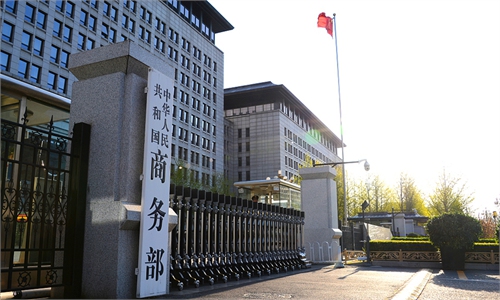
An engineer analyzes chips at a chip factory in Nantong, East China's Jiangsu Province in February. Photo: VCG
The US move of labeling China for committing "economic coercion" is putting its allies like South Korea in an awkward position when it comes to the latter's normal economic and trade cooperation with China. Their economies could face significant risks if they don't adopt a pragmatic approach to the dilemma.
US Commerce Secretary Gina Raimondo said on Saturday that the US "won't tolerate" China's ban on purchases of Micron Technology memory chips and is working closely with allies to address such "economic coercion," Reuters reported.
If anything, her remarks gave the impression that the US is pushing harder to force its allies like South Korea to take sides by branding China's justified activity as "economic coercion," which will risk the normal industrial chain cooperation between these countries and China.
For instance, a Bloomberg report, citing a person familiar with the situation, said that the South Korean government won't encourage its memory chip firms to absorb market share in China lost by Micron. The news came just after China and South Korea agreed to strengthen dialogue and cooperation on semiconductor supply chains during a meeting between Chinese Commerce Minister Wang Wentao and South Korea's Trade Minister Ahn Duk-geun on Friday, according to a statement from China's Ministry of Commerce.
If China and South Korea are to step up their semiconductor cooperation, it will be natural to see South Korea chip companies to fill some market gap in China, which may not necessarily be exactly that lost by Micron.
In fact, it is hard to identify specifically which market share Micron has lost as market demand changes. So the US demand that the South Korean government ban South Korean chipmakers from filling the gap left by Micron in the Chinese market is actually aimed at curbing the chances for South Korean chipmakers to further expand their businesses in China. Such attempt is a clear interference in mutually beneficial and legitimate commercial cooperation among other countries and a violation of the international trade rules.
Assuming China ask other telecoms companies not to fill the market gap left by Huawei after the Chinese giant's 5G networks was banned by the US and its allies, one would understand how domineering the US demand this time really is and why the US is the real rule breaker and a source of major uncertainty to the global trade system.
However, in the face of overbearing orders from Washington, the South Korean government doesn't seem to have the courage to oppose it as indicated by the Bloomberg news. To a certain extent, the situation South Korea is facing is representative among the US allies these days.
Indeed, the US influence has already become a major source of uncertainties in South Korea's cooperation with China. If South Korea cannot shrug off such interference, then both China and South Korea will have to face serious economic consequences.
This is because the US crackdown on Chinese semiconductor industrial chain has affected the most important part of bilateral trade between China and South Korea. China is South Korea's top semiconductor buyer, purchasing 39.7 percent of overall South Korean chip exports in 2021, according to a research conducted by the Korea Chamber of Commerce and Industry. That means there is no possibility for South Korea to replace its chips with other goods in its exports to China, or shift its chip market to the US or any other country in the short term.
In addition, over the years, South Korea's trade with China was somehow conducive to promoting its trade with the US. China and South Korea supply each other with a lot of intermediate goods, which are eventually exported to the US, while the two countries also buy many kinds of intermediate goods from the US for further processing. The US has profited greatly from trade between China and South Korea. If South Korea's trade with China weakens, so will be its trade with the US. Therefore, the crux for South Korea is to make pragmatic choices or its economic outlook will be extremely worrying.



